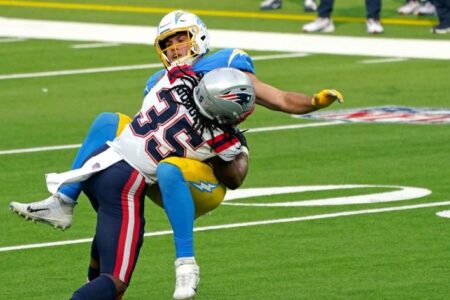Onedaful
Rotational Player and Threatening Starter's Job
- Joined
- Feb 8, 2012
- Messages
- 1,347
- Reaction score
- 786
Registered Members experience this forum ad and noise-free.
CLICK HERE to Register for a free account and login for a smoother ad-free experience. It's easy, and only takes a few moments.You are saying all 6 seeds have an equal chance so that is the assumption I am proceeding with in this post. So now here's the thing that is going to blow your mind:
You're right that there is a 1.5% chance that all 6 seeds win it once in a 6-year span. But guess what??? Even though there is only a 1.5% chance that all 6 seeds win it exactly once, that is still the most likely outcome...!!! That is still, statistically speaking, the most expected outcome. And not a single intelligent human being would ever claim that observing the most expected outcome is evidence of bias.
Let me ask you a very simple question (which I know you won't have the guts to answer): If you rolled a 6-sided die 6 times and got one 1, one 2, one 3, one 4, one 5 and one 6 (in any order), would you say "holy crap! The probability of that happening is only 1.5% so the die must be rigged!!!!!"?
That isn't what I asked, so I am going to try again:Ok, first of all, good so were on the same page there and I'm not sure what you're ridiculous point is. You're telling me something I already know, and we clearly agree on.
But to to answer your question, with the probability being ONLY 1.5%, of hitting that string of 6 consecutive unique numbers, and with that being our "winning condition" I would say if you only rolled the dice 15 times, and you came out with that outcome, then you are incredibly lucky.
That isn't what I asked, so I am going to try again:
If you rolled a 6-sided die 6 times, and got exactly one 1, one 2 (etc) would you consider that evidence that the die is biased?
Because that's what you're doing here. Only you don't realize it.
Wrong. Getting the most expected outcome, no matter how improbable it was, is not evidence of a fix.Of course not, and it's not only something I do realize, I have already stated pages ago, that this alone is not evidence of a fix, it's just evidence that supports it. Call it circumstantial evidence if you want. I never stated impossible, just highly improbable.
This analogy is absolutely bankrupt for far too many reasons to go into here.There's plenty of examples(or I should say hearsay) where people play the lottery 1 time in their life and win it all, and no that doesn't mean the lottery is rigged, but that doesn't change the fact he was that 1 in a 177 million chance. As I have said, it could simply be evidence the NFL is getting that 1 in a million chance of lucky parity.
I absolutely acknowledge it is a rare occurrence but here's the most important thing in this discussion which you are obviously 100% clueless about. This is the #2 rule of statistical analysis:Having said that, you do still realize and at least acknowledge, that the chances of that happening are very freaking slim, right? And that this string of number, isn't just some random string, but it does in fact represent a perfect mix of winning seeds over the shortest possible time span. A Jackpot in terms of parity. This would be considered a rare occurrence.
You're comparing 2 entirely different numbers. A p-value is not the probability of getting the results we observed. A p-value speaks to the statistical likelihood of there being conclusive evidence off anything occurring outside that which we would normally expect. 0.08 is low, but not low enough to reach the statistical threshold used in the grown up world.Now I have answered your question, you still failed to answer mine and I'm betting you wont. Because once again, the number isn't 8% and it's not 1.5%.
I thoroughly enjoyed schooling you last night during the interminable UCLA game, my ignorant friend, but now it's time to move on and allow you to wallow in your own obscene ignorance. This will be my last post responding to you.
Wrong. Getting the most expected outcome, no matter how improbable it was, is not evidence of a fix.
This analogy is absolutely bankrupt for far too many reasons to go into here.
I absolutely acknowledge it is a rare occurrence but here's the most important thing in this discussion which you are obviously 100% clueless about. This is the #2 rule of statistical analysis:
Just because something improbable happened, that does not demonstrate anything conclusively. No matter what happens, it will be something improbable.
You're comparing 2 entirely different numbers. A p-value is not the probability of getting the results we observed. A p-value speaks to the statistical likelihood of there being conclusive evidence off anything occurring outside that which we would normally expect. 0.08 is low, but not low enough to reach the statistical threshold used in the grown up world.
The hilarious thing is that you're not even intelligent enough to realize your biggest piece of supporting evidence. Your "Exhibit A" should not be the 6-seeds-in-6-years thing, which is just a blip. Your "Exhibit A" is the fact that 3 Wild Card seeds (5 or 6) won in a 7 year timespan. THAT fact is the best evidence that something is afoot but even then, those of us that understand football realize that it has logical reasons behind it, such as the fact that the Giants front 4 d-lineman were able to pressure Brady, allowing 7 men to drop into coverage, etc.
The fact of the matter is the chances of 6 seeds advancing in 6 years are freaking lottery odds!
The chances of just a 6 seed alone even winning 6 times in 100 years is 6%!
The fact of the matter is that the chance of any particular seed ordering over 6 years advancing is freaking lottery odds.
And if it was a different ordering (say all 2 and 3 seeds over the 6 years), you'd be saying the same thing and making the same accusations using this slightly different scenario. That's what conspiracy theorists do. (I know, my brother is one and I've had ample opportunities to listen and think through the claims.)
The historical facts really aren't all that relevant to a conspiracy theorist. No matter what the facts are, they are always trying to convince someone (themselves at least) that "it is wildly improbable that this could happen by chance. Someone must be rigging the result!"
You're particular theory that has six different seeds advance in six straight years is novel in the sense that the ordinary person off the street would be saying, "who cares? Why would anyone be trying to rig that result?" Ah, but the conspiracy theorist is convinced that someone cares because that's what happened and there's a conspiracy. It's just a matter of statistically proving it (to others).
Good luck.
:bricks:
Exactly. No matter what outcome is observed, the probability of that specific outcome is going to be extremely low. The ignorant observer can grab any 6 year stretch, look at the results, and say "holy smokes! The odds of those exact results coming up are ridiculously low, so it must be rigged!" That is why statistical techniques exist to try and determine how far away the observed events are relative to the expected outcome.And if it was a different ordering (say all 2 and 3 seeds over the 6 years), you'd be saying the same thing and making the same accusations using this slightly different scenario.
Exactly. No matter what outcome is observed, the probability of that specific outcome is going to be extremely low. The ignorant observer can grab any 6 year stretch, look at the results, and say "holy smokes! The odds of those exact results coming up are ridiculously low, so it must be rigged!" That is why statistical techniques exist to try and determine how far away the observed events are relative to the expected outcome.
In this case, it is worth noting that 3 WC's winning in a 7 year span is unusual. But it hardly rises to the level of statistical proof of anything. (The all-6-seeds-in-6-years thing is virtually meaningless)
The #1 thing working against our ignorant friend is the low sample size. When n=7, it's pretty tough to prove anything. 3 WC's winning in 7 years means nothing. But 30 WC's winning in 70 years would definitely get my attention.
Hmm. Sounds like you're rewriting the probability theory I learned in high school. I won't ask you for the calculations you used to arrive at the statement above.
A wise man once said, "'tis better to be quiet and thought a fool than open one's mouth and remove all doubt".














